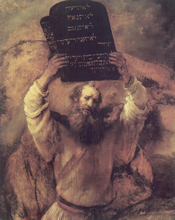
15 Apr 2007
ROSSINI: Mosè
Mosè (Moïse et Pharaon, ou Le passage de la Mer Rouge), Melodramma in four acts
Mozart and Salieri, an opera in one act consisting of two scenes.
Nicolai Rimsky-Korsakov (1844-1908), composer. Libretto derived from Alexander Puskhin's play of the same name.
First performance: 7 December 1898 in Moscow.
Ariadne auf Naxos, Oper with a prologue and one act. Music composed by Richard Strauss. Libretto by Hugo von Hofmannsthal.
La Vestale, a tragédie lyrique in three acts.
Boris Godunov, an opera in four acts with prologue
Modest Mussorgsky, composer. Libretto by the composer, based on Alexander Pushkin's drama Boris Godunov and Nikolai Karamazin's History of the Russian Empire
First performance: 8 February 1874 at the Mariinsky Theatre, St. Petersburg
Il Trovatore, dramma in four parts.
Only a few months following the premiere of Der Rosenkavalier, Hugo von Hofmannsthal proposed a new opera to Richard Strauss based on Molière’s comedy-ballet, Le Bourgeois gentilhomme (in German, Der Bürger als Edelmann).
Die Entführung aus dem Serail, Singspiel in 3 Acts.
Music composed by Wolfgang Amadeus Mozart (1756–1791). Libretto by Johann Gottlieb Stephanie the Younger, based on an earlier libretto by
Christoph Friedrich Bretzner.
Die Entführung aus dem Serail, Singspiel in 3 Acts.
Music composed by Wolfgang Amadeus Mozart (1756–1791). Libretto by Johann Gottlieb Stephanie the Younger, based on an earlier libretto by
Christoph Friedrich Bretzner.
Arabella: Lyrische Komödie in three acts
Die Entführung aus dem Serail, Singspiel in 3 Acts.
Music composed by Wolfgang Amadeus Mozart (1756–1791). Libretto by Johann Gottlieb Stephanie the Younger, based on an earlier libretto by
Christoph Friedrich Bretzner.
La Gioconda, dramma lirico in four acts.
Music composed by Amilcare Ponchielli (1834–1886). Libretto by Arrigo Boito (under the pseudonym Tobia Gorrio), based upon Victor Hugo's Angelo, Tyrant of Padua (1835).
Don Carlo, an opera in four acts. Music composed by Giuseppe Verdi (1813–1901). Libretto by Joseph Méry and Camille Du Locle after Friedrich von Schiller’s dramatic poem Don Carlos, Infant von Spanien. Revised version in four acts (French text revised by Du Locle, Italian translation by Achille de Lauzières and Angelo Zanardini).
Un ballo in maschera, a melodramma in three acts.
Music composed by Giuseppe Verdi. Libretto by Antonio Somma, based upon the work of Eugène Scribe Gustave III ou Le bal masqué (1833)
Medea: Melodramma tragico in three acts.
Die Tote Stadt, an opera in three acts.
Music composed by Erich Wolfgang Korngold (1897-1957). Libretto by Paul Schott (Julius and E. W. Korngold) after the novel Bruges la morte by Georges Rodenbach.
Some Details concerning the Revolution inaugurated by Rossini
Manon Lescaut, dramma lirico in quattro atti
Elektra: Tragedy in one act.
Lyric Opera of Chicago has announced both schedules and cast-lists for is Spring 2020 performances of Richard Wagner’s Ring Cycle. Given the series of individual productions already staged by the company since Fall 2016, that pave the way for the complete cycle, Lyric Opera of Chicago’s complete production should affirm the artistic might of the great composer.
“Diacono himself does not know what musical talent he possesses” – Mascagni

Mosè (Moïse et Pharaon, ou Le passage de la Mer Rouge), Melodramma in four acts
Music composed by Gioachino Rossini. Libretto by Luigi Balocchi and Étienne de Jouy, Italian translation by Calisto Bassi.
First Performance: 26 March 1827, Opéra, Paris
| Principal Characters: | |
| Mosè, the Hebrews’ lawgiver | Bass |
| Elisero, his brother | Tenor |
| Faraone, King of Egypt | Bass |
| Aménofi, his son | Tenor |
| Aufide, Egyptian officer | Tenor |
| Osiride, High Priest | Bass |
| Maria, sister of Mosè | Mezzo-Soprano |
| Anaìde, her daughter | Soprano |
| Sinaide, wife of Faraone | Soprano |
| A mysterious voice | Bass |
Setting: Ancient Egypt
Synopsis:
Moses promises to lead the Israelites out of captivity in Egypt. Anaïs and her mother have been released by Pharoah on the intervention of Queen Sinaïs, who is sympathetic to the Israelites. Anaïs loves Pharoah's son, but intends to leave with her people, while her lover Amenophis has decided she must stay. Moses brings upon Egypt the plague of darkness. This is raised, with freedom again promised, while Pharoah has arranged a marriage for his son Amenophis with an Assyrian princess, to his distress. The High Priest Osiris demands that Moses pay reverence to Isis before the Israelites leave. Moses refuses and the Israelites are sent away in chains. Amenophis and Anaïs meet, he still hoping that their love may be permitted. He warns her that Pharoah's army is pursuing the Israelites, who are now triumphantly led by Moses across the Red Sea, while Pharoah's men are drowned.
Rossini adapted his earlier opera Mosè in Egitto (Moses in Egypt) as Moïse et Pharaon, ou Le passage de la Mer Rouge (Moses and Pharoah, or The Passage of the Red Sea) for Paris, with a new libretto, creating the necessary grand opera spectacle that France demanded. Staging of the French version of the work makes obviously heavier demands on resources. This second opera for Paris marks a further step by Rossini towards his fourth and final opera for the French capital, Guillaume Tell (William Tell).